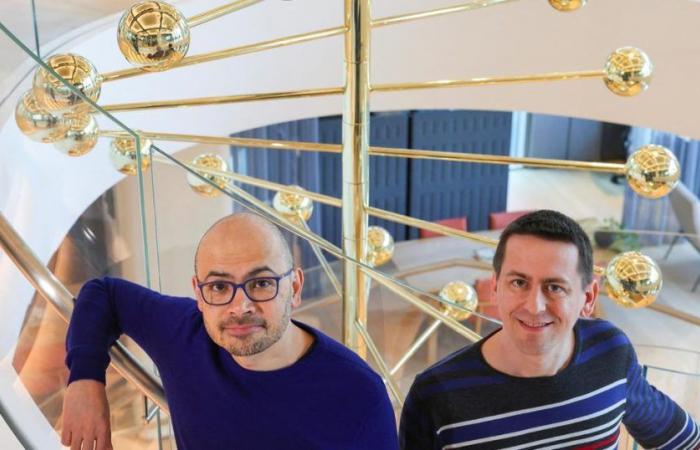FIGAROVOX/TRIBUNE – The awarding of the 2024 Nobel Prizes in Physics and Chemistry marks the advent of artificial intelligence as the main driver of scientific discoveries, analyzes the author of “ChatGPT will make us immortal”. According to him, this development raises major ethical questions.
Laurent Alexandre is a urological surgeon and essayist. Latest book published: ChatGPT will make us immortal (2024, JC Lattès editions).
The 2024 Nobel in physics has just been awarded to Geoffrey Hinton and John Hopfield, while the Nobel in chemistry honors Demis Hassabis and John M. Jumper. These two distinctions awarded to emblematic figures of artificial intelligence (AI) mark an unprecedented shift in the history of scientific research. What does this recognition mean for the future of science and researchers?
We are witnessing the advent of AI as the main driver of scientific discoveries. Geoffrey Hinton and John Hopfield, pioneers of deep neural networks, laid the foundations for deep learning that is revolutionizing our understanding of the world. For their part, Demis Hassabis and John M. Jumper, through the advances of AlphaFold, have solved the mystery of protein folding, opening the way to unprecedented biotechnological innovations. Demis Hassabis, head of all AI at Google since April 23, 2023, is the leading specialist in neuro-AI, that is to say the association of neuroscience and AI.
Whether one is optimistic or pessimistic, this double consecration is not trivial. It symbolizes the emergence of AI as an essential tool in the quest for scientific knowledge.
Laurent Alexandre
Two uses of Google-DeepMind AI have astonished the scientific world. AlphaFold discovered in a few weeks the three-dimensional structure of 200 million proteins and AlphaMissense makes it possible to determine the medical impact of mutations in our DNA. On January 2, 2024, John Thornhill explains in the Financial Times that until now it took five years of work for a biochemist to determine the structure of a single protein in 3D. Thus, the analysis of 200 million proteins by AlphaFold represents the equivalent of the work of a billion human biochemists for a year. Without AI, this work would have taken the global scientific community several thousand years. Pharmaceutical research will benefit from the significant progress made by Google-DeepMind. On December 20, 2023, Eric Topol publishes in Nature the discovery of a new class of antibiotics using AI, which has not happened for thirty-eight years. On January 10, 2024, Demis Hassabis declared that his new biological AI would reduce the development time of new drugs from five to two years. A great wave of innovations is before us and the pharmaceutical industry is rushing into the anteroom of Google’s leaders.
Also readScientists model head of 2.6 meter long extinct giant centipede
Demis Hassabis sums up humanity’s dilemma in a few words: “AI will help us make unimaginable leaps in our understanding of the world… but only if we allow algorithms to learn on their own. » He is convinced that he is leading the “21st century Apollo program” and that his AIs will revolutionize science. He explains: “Cancer, climate, energy, genomics, macroeconomics, financial systems, physics: these systems… are becoming so complex. It becomes difficult for even the most intelligent humans to master these subjects in a lifetime. » AI will work in tandem with human experts to solve all of humanity’s problems. Demis Hassabis is very clear, AI will solve the major problems of humanity provided that we are not castrating by demanding that it think like us. For Hassabis, AI must stop being human intelligence in a box: we must liberate it.
Also readLaurent Alexandre and Olivier Babeau: “ChatGPT, “Pravda” 2.0?
This optimistic vision is not shared by the new Nobel Prize in physics. John Thornhill of Financial Times interviewed Geoffrey Hinton ahead of his lecture on February 19, 2024 in Oxford. The speech of the new Nobel Prize winner in physics was entitled: “Will artificial intelligence replace biological intelligence?” Hinton a conclu : “Certainly, yes.” The researcher believes that AIs like ChatGPT are evolving in dangerous ways and seeking to control the world: “I would say there is a 10% chance that AI will exterminate humanity within twenty years. I argue that these systems understand the world. AI can create hives of minds sharing their knowledge which will create a better intelligence than ours.
Whether one is optimistic or pessimistic, this double consecration is not trivial. It symbolizes the emergence of AI as an essential tool in the quest for scientific knowledge. Algorithms now surpass human intuition in complex fields, redefining the role of the researcher. Gone are the days of the scientist isolated in his laboratory; place for the expert capable of collaborating with AI endowed with phenomenal power.
The boundaries between disciplines are blurring: physics, chemistry, biology and computer science are converging towards an interdisciplinarity induced by AI.
Laurent Alexandre
Researchers now need to master AI skills to stay relevant. The boundaries between disciplines are blurring: physics, chemistry, biology and computer science are converging towards an interdisciplinarity induced by AI. Those who refuse this change will be relegated to the rank of spectators of a revolution that goes beyond them.
Obviously, this development raises major ethical questions. AI, by establishing itself at the heart of research, poses the problem of technological dependence and control of discovery processes. Who will be responsible for innovations produced by algorithms? How can we ensure that these advances serve the common good?
Academic institutions and funding bodies need to rethink their models. It is imperative to invest heavily in training for AI tools. By awarding the Nobel Prizes in physics and chemistry to AI “divas”, the Nobel committee sends a strong message: the future of science is inseparable from Artificial Intelligence. Researchers are at a crossroads. They can choose to become architects of a new era of science or remain anchored in outdated methods.
Also readAurélie Jean: “When the Nobel Prize in Physics recognizes the revolutionary scope of AI”
AI is not just a toolbox, but an essential partner with which researchers must deal. The revolution is underway. Those who know how to embrace this change will participate in discoveries that will shape the world of tomorrow. The others will contemplate the evolution of science without them: they will be crushed
France, rich in its talents and its scientific heritage, must encourage innovation, support its researchers and invest in AI. Let us not miss this historic opportunity to position our country at the forefront of global research.
The recognition of Hinton, Hopfield, Hassabis and Jumper is more than an individual accolade. This is a major turning point for research and researchers around the world. Researchers must seize this opportunity to redefine the face of 21st century science.






